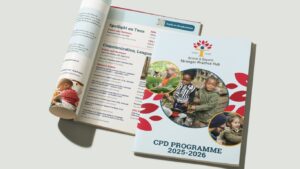
Jo Ingleby is the Head of Food Education and leads The Children’s Kitchen project, which works with partner organisations to develop education and understanding of food across the city and encourages children and families to cook and grow fresh produce. Jo leads the HAF (Holiday Activities and Food) food education work; developing and filming the recipes and films, creating cookery and growing activity packs and also designing and delivering the Family Food Sessions. This involves professional development for practitioners and linking settings with local chefs, food organisations and growing projects. Jo is a chef and food educator with a particular focus on working with young children and their families in early years settings. Jo was awarded BBC Cook of the Year 2015 for her work with Redcliffe Children’s Centre.
From September 2025, the updated Early Years Foundation Stage (EYFS) Nutrition Guidance will become a statutory part of the safeguarding and welfare requirements for all early years providers. This includes Maintained Nurseries, Private Voluntary (PVI)settings, childminders, and schools with nursery classes—any setting that provides food, drinks, or snacks.
The guidance offers clear, practical advice on what to provide, limit, or avoid, supporting informed food choices. All providers will need to review and, if necessary, update their menus, snacks, and drinks policies before September. Because the guidance is publicly available, parents may begin asking more questions about food provision. Although formal monitoring isn’t yet in place, Ofsted may refer to the guidance during inspections.
The guidance should be followed unless there is a compelling reason not to do so. It marks a key step in tackling public health concerns such as obesity and dental health, which disproportionately affect children from low-income backgrounds.
Children in the most deprived fifth of the population are nearly twice as likely to be living with obesity as those in the least deprived fifth by their first year of school.
– The Broken Plate 2025 – The Food Foundation
Addressing nutrition in the early years helps close this long-standing health gap.
For ten years, I had the privilege of cooking for 140 children at Redcliffe Nursery School, where we created a child-led approach to food, cooked from scratch, and introduced food exploration sessions using fresh produce. Back then, guidance was voluntary, hard to find, and not monitored. We created an award-winning multicultural menu that supported choice and encouraged practitioners to eat with children from self-serve dishes.
Looking back, I would have welcomed clearer guidance. Shockingly, little has changed—until now. The food environment for young children has worsened, with ultra-processed foods heavily marketed to families. It’s now common to see toddlers sucking from food pouches instead of developing chewing and spooning skills.
New updated NHS guidance now advises against letting babies suck directly from pouches due to the risk of tooth decay and urges home-cooked food over processed snacks.



What’s in the New Guidance?
Much of the guidance focuses on main meals, especially those cooked onsite. It includes support with allergies, special diets, portion sizes, and balanced meals, guides to weaning and baby foods. This makes it essential reading for nursery chefs, outside caterers, and any childminder or setting that prepares food.
However, there are broader changes that apply across all types of settings, including those who don’t cook or have catered meals.
Cakes, biscuits, and puddings
The guidance now aligns early years food with the School Food Standards used in primary and secondary schools. Previously, a lack of clear messaging caused uncertainty around the appropriateness of sweet foods, ultra-processed snacks, and sugary drinks in early years settings. This was particularly concerning, given that younger children have an even lower tolerance for sugar, salt, and fried foods than older children.
Under the new rules, ultra-processed foods are restricted, and puddings are no longer recommended, except for fruit and unsweetened yoghurt or fromage frais. This will require changes to menus and communication with families about why these changes are being made. Instead, the guidance recommends a two-course meal with a dip, salad or starter instead of a pudding on days when yoghurt or fruit isn’t served.
Drinks and snacks
Only water and milk should be served. Biscuits, cakes, sweets, and chocolate should not be offered at all. While many settings may already follow these practices, this guidance makes nutrition a visible and consistent part of the EYFS framework. The guidance also recommends that cakes aren’t brought in from home for celebrations because of the health factors but also, importantly, the potential for allergens.
Snacks should also reflect the guidance. This means not just offering fruit, but combining fruits and vegetables with sources of carbohydrates, dairy and protein. This is an exciting opportunity to make snack times more interactive—children can prepare their own wraps, dips, or rice cakes, supporting both nutrition and skill-building.
Portion sizes and stages of eating.
The guidance is clearly laid out with infographics and straightforward advice on portion sizes, allergens, and food development from weaning through to full meals. It promotes tailoring food to the child’s stage—not just their age—and maintaining strong communication with families. While this can feel daunting for some settings, it provides the kind of consistent, evidence-based support we’ve long needed.
Healthier lunchboxes
While the guidance is detailed for hot meals, it’s less comprehensive for packed lunches. Yet many settings, especially those without kitchens or lunch staff, rely on lunchboxes. To follow the guidance in full, settings must also consider how to support families in providing healthy packed lunches. This means offering simple, clear, and affordable suggestions for parents. It’s helpful to explain that additional drinks aren’t needed, as milk and water are available during the day. The guidance can now be cited as a rationale for changes in policy, and many families appreciate help with portion sizes and food waste reduction. Creating a Food and Nutrition Policy for your setting can help to put all of this advice in one place.



Why This Matters Now
Now more than ever, it’s time to shine a light on early years nutrition. At The Children’s Kitchen, we work in areas of Bristol where food insecurity is a daily reality. We support children to grow, explore, and enjoy fresh vegetables. We see first hand the confusion caused by mixed messages, marketing of ultra-processed foods, and the challenge of preparing healthy meals on a tight budget.
Organisations like the Trussell Trust report rising food bank use, and many families simply cannot access or afford a balanced diet. In the context of this ongoing cost-of-living crisis, providing families with clear, practical, and affordable food guidance is more important than ever.
The new guidance gives us a shared language and a clearer framework to build on. It’s a chance to work together; practitioners, families, and communities, to improve the health of young children.
What You Can Do Next
- Read the guidance and highlight parts relevant to your setting.
- Review your menus and snacks and check that outside caterers are compliant.
- Communicate clearly with staff and families about any changes.
Further Reading
- First Steps Nutrition Trust
- Food Active – New NHS guidance recommends parents avoid baby food pouches: Food Active response
- First Steps Nutrition Ultra Processed Foods article
- The Food Foundation Early Years Report 2025



